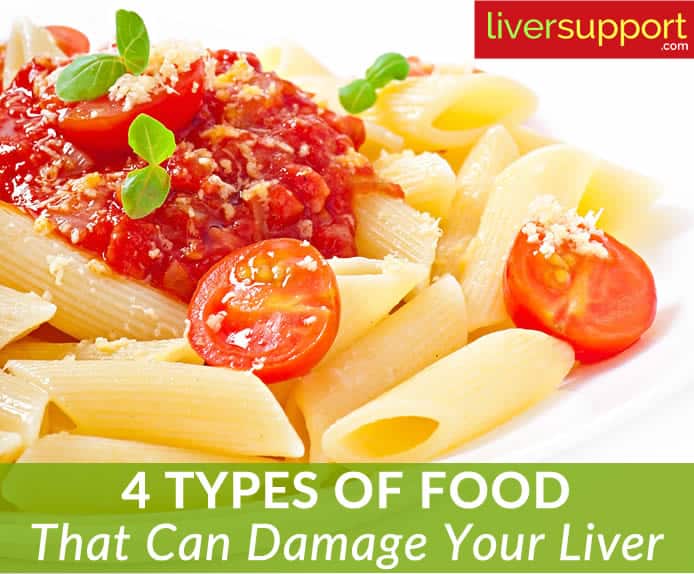
Previous
Liver Detox Simplified: 3 Step Liver Detox Plan

Next
How Will I Know If I Need a Liver Transplant?
Foods to Avoid for Liver Health
While we all indulge once in a while, choosing a steady diet of these types of foods may lead to liver damage over time.
The liver is a critical organ that plays a vital role in the metabolism of food and in the digestive process. Often the liver becomes fatty, a condition known as steatosis. This may be due to chronic alcohol usage or from a poor diet high in fat and carbohydrates. It can eventually lead to cirrhosis, or permanent scarring of the liver. Toxic exposure from the environment or from chemicals consumed, and damage from infection such as hepatitis along with several other conditions, can also lead to cirrhosis, and eventually to liver failure. According the American Liver Foundation, up to 25% of Americans have some liver condition that negatively impacts liver function.
While a healthy diet is important for overall health, it is especially key for liver health. Just as important as eating a healthy, high-fiber, vegetable-filled diet is also knowing what types of foods to avoid in order to improve liver health.
4 Types of Food That Can Damage Your Liver
- Alcohol – Alcohol is a toxin in the body and the liver is the primary organ responsible for filtering toxins out of the blood. Alcohol in particular is especially damaging to liver cells, and is commonly associated with cirrhosis, or scarring, of the liver tissue. In addition, the liver’s primary job is to process excess glucose, storing it in the liver and eventually as body fat when the liver is full of glycogen. Alcoholic beverages are typically very high in carbohydrates, making over-consumption a double whammy on the liver – a heavy load of toxins to filter along with a high spike in glucose to process.
- Saturated and Trans Fats – Overall dietary fat should, of course, be limited, but saturated fats and trans fats present a higher risk to the liver. Saturated fats come from animal products and have been shown to raise the “bad” cholesterol, or low-density lipoproteins (LDL). Fats from meats and dairy are saturated fats. Trans fats comes from oils that have been partially hydrogenated and not only raise LDL cholesterol, they actually lower the “good” cholesterol, or high-density lipoproteins (HDL). Trans fats are found in highly processed foods such as potato chips, doughnuts and cakes as well as candy. These damaging fats will quickly overload an already struggling liver.
- Sucrose and High Fructose Corn Syrup – Cakes, candies, pastries and other sweets all contain both high levels of sucrose (table sugar) and high fructose corn syrup, a highly processed form of carbohydrate. These foods all have a high glycemic index, meaning they are all foods that raise blood sugars extremely high. The glycemic index refers to the rate at which blood sugar rises in relation to consumption of the food, over a specific period of time. Foods with a high glycemic index trigger a rise in insulin to process the spike in glucose. That rise in insulin triggers the liver to begin storing the excess in liver cells and, when the liver is full, it converts the excess to body fat for long term storage. This often results in fatty liver, or nonalcoholic fatty liver disease (NAFLD). If left unmanaged, it can develop into nonalcoholic steatohepatitis (NASH), and even cirrhosis.
- Carbohydrates – Beyond sugars such as sucrose and high fructose corn syrup, all carbohydrates have to the potential to overload the liver. Breads, pasta and other foods with white flour are often high in carbohydrates and low in fiber, making them a high glycemic food that will spike blood sugar levels. Without the natural fiber found in whole grains, the carbohydrate is processed all at once, where in whole grain foods, the fiber slows down the digestive process by binding with fats and other foods in the digestive tract. To avoid this, eliminate white bread, white flour pasta and other foods made with white flour as there is little to no fiber in this over processed flour.
Just as important as knowing what foods are good to eat – is knowing what foods to avoid. Alcohol, along with foods with particularly high amounts of carbohydrates and fats will overload your liver.
Editor’s Note: If you’re looking for comprehensive liver care, including reducing the accumulation of fat in your liver, learn more about Clinical LiverSupport. It has 12 natural supplements in 1 bottle to address all of your liver’s needs.
American Liver Foundation. (2016). The liver lowdown. American Liver Foundation. Retrieved on 7/31/16 from http://www.liverfoundation.org/education/liverlowdown/ll1013/bigpicture/
Cabot, S., MD.; Eanelli, T., MD. (2010). Fatty liver: You can reverse it. Glendale, AZ: S.C.B. Inc. International.
Liver Foundation. (n.d.). Some liver diseases have specific diet recommendations. The Liver Foundation. Retrieved on 10/11/16 from http://www.liverfoundation.org/education/liverlowdown/ll0813/dietrecos/.
Liver Foundation. (n.d.). So, what healthy foods should you eat? The Liver Foundation. Retrieved on 10/11/16 from http://www.liverfoundation.org/education/liverlowdown/ll0813/healthyfoods/.
Sugar Science. (2016). How much is too much? Sugar Science. Retrieved on 9/26/16 from http://www.sugarscience.org/the-growing-concern-of-overconsumption/#.V-lTHST-o30.







Don’t eat anything good anymore. It’s that simple.
when it said carbohydrates, my immediate thought was fruit. Perhaps it would be better to say refined grains and flours.
FYI…Your body doesn’t know the difference in carbohydrates and processes both of them the same. Diabetics have to count “carbs”, not just “sugars”, so it makes no difference in body PROCESSING whether you eat candy, flour or fruit. The benefit of fruit though is it provides fiber and nutrients that candy and refined flours doesn’t.